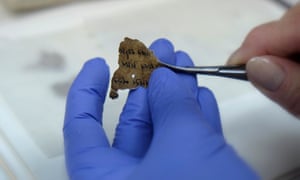
The Museum of the Bible has declared that five of its most prized antiques – significant sections in its gathering of Dead Sea Scrolls – are frauds that will never again be shown at the historical center in Washington DC.
Analysts in Germany tried five of the exhibition hall's 16 parts, purchased by the extremely rich person businessperson and gallery originator Steve Green, and deciding they indicated "qualities conflicting with antiquated source".
The declaration pursues disclosures in the Guardian a year ago that cast question about the realness of as of late sold parts, including those bought by Green, and featured the specially appointed nature of cutting edge exchange the implied antiques. Singular sections have sold for seven-figure wholes, in spite of the fact that it isn't known the amount Green paid for the exhibition hall's gathering.
The Dead Sea Scrolls were found by Bedouin shepherds in the Qumran Caves in the West Bank in the 1940s and changed the investigation of the early book of scriptures. The parchments, which add up to more than 100,000 sections, incorporate entries from the Old Testament translated over 2,000 years back.
"In spite of the fact that we had trusted the testing would render distinctive outcomes, this is a chance to teach the general population on the significance of checking the validness of uncommon scriptural antiques, the intricate testing process embraced and our pledge to straightforwardness," said Dr Jeffrey Kloha, the boss curatorial officer for Museum of the Bible.
The Museum of the Bible's opening was buried in discussion over its showcase of the sections and its relationship with Green, a fervent Christian who is leader of expressions of the human experience and art supply bunch Hobby Lobby.
In July of a year ago, Hobby Lobby consented to relinquish more than 5,500 antiques snuck out of Iraq following a government examination.
In an announcement the Museum of the Bible said it had sent the five parts to Bundesanstalt für Materialforschung und-prüfung (Bam) for a progression of cutting edge tests, including material examination and x-beam exams, which exacerbated past research that drew the section's credibility into inquiry.
Specialists are proceeding to analyze whatever remains of the exhibition hall's accumulation of Dead Sea Scrolls, with one scholarly, Dr Kipp Davis of Trinity Western University, expressing he has finished up no less than seven of the gallery's sections are phony.
"My examinations to date have figured out how to affirm upon a dominance of various floods of proof the high likelihood that no less than seven sections in the exhibition hall's Dead Sea Scrolls accumulation are current imitations, however ends on the status of the rest of the parts are as yet imminent," Davis said in an announcement distributed by the historical center on Monday.
"The historical center keeps on supporting and energize look into on these articles and others in its gathering both to illuminate people in general about driving edge inquire about strategies and guarantee our shows are displaying the most precise and refreshed data," said Kloha.
0 comments:
Post a Comment